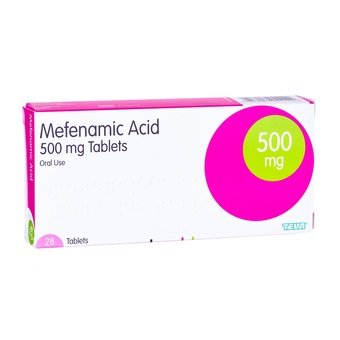Medication features
Mefenamic acid is an example of an NSAID, which is a non-steroidal anti-inflammatory drug. It is an effective medication for a woman who suffers from period pain. It is taken three times a day for lasting relief.
- Used to treat period pain
- Can reduce bleeding
- Active Ingredient: Mefenamic Acid
- Faster acting than conventional painkillers
Overview
Buy Mefenamic Acid Online UK
You can order Mefenamic Acid for period pain from our UK registered online pharmacy. No prescription is required, however, you will need to complete an online assessment, so our prescriber can issue a prescription to our pharmacy. If the prescriber approves your order, a prescription is passed to our pharmacy, who will then dispense and dispatch your medication.
Mefenamic Acid for Period Pain
Most women will experience Period Pain at some point in their lives, for those who experience painful periods often it can be very uncomfortable. Mefenamic Acid 500mg Period Pain Relief can help stop period pain.
Excessively heavy periods can be treated, caused by abnormal function and presence of a contraceptive oil, if a disease of the pelvis has been ruled out.
These heavy periods can be difficult to define because it can vary woman to woman. Having so much blood can be normal for one woman, but abnormal for the next.
The majority of women can determine whether or not the amount of blood present is normal for them.
Mefenamic acid can be taken as long as you need, ensuring that they are making the bleeding less heavy and not causing any significant side effects. It’s important to not take more than the recommended daily dose listed on the packet.
What is Mefenamic Acid?
Mefenamic acid is one of the groups of medicines called non-steroidal anti-inflammatory drugs. It is used to relieve many different kinds of pain or discomfort but primarily for relief of period pain. It can also be prescribed to women after childbirth.
It is a prescription medicine and is the active ingredient in the brand-name drug Ponstel. Generic drugs usually cost less although they contain the same ingredient.
By blocking a naturally occurring chemical called cyclo-oxygenase enzymes, the body produces fewer chemicals called prostaglandins. Some of these prostaglandins are produced at sites of injury and can cause pain and inflammation. So by blocking these from producing, Mefenamic Acid helps relieve pain and inflammation.
For a more complete answer on ‘What is Mefenamic Acid?’ talk with your doctor or consult the patient information leaflet.
What are the benefits of taking Mefenamic acid?
Periods vary from woman to woman but for some women, they can be an extremely uncomfortable and painful experience that last for a prolonged amount of time.
Taking Mefenamic acid to relieve this pain allows women to go about their daily life, whatever stage of their menstrual cycle they’re in.
Mefenamic Acid Dosage
Mefenamic Acid is available in 500mg tablet form, taken orally.
Before treatment is started, it is advised that you read the manufactures patient information leaflet, inside the packaging.
Mefenamic acid tablets should be taken at the exact direction our prescriber has given you.
Mefenamic acid 500mg is the dose usually given and is to be taken THREE times a day.
Taking it when period pain arises, your prescriber will likely suggest that it’s taken for a few days each month, starting whenever the bleeding begins. It’s suggested to be taken with food, helping protect the stomach from stomach related side effects such as indigestion.
Mefenamic Acid and Alcohol
Do not take Mefenamic Acid and Alcohol together. For any reason that they need to be taken together, talk to your doctor first.
Alcohol can increase the risk of stomach symptoms such as bleeding, when taken in combination. If you experience this, call your doctor immediately.
Bleeding in the stomach or intestine symptoms include:
- Black, blood or tarry stools
- Vomiting or coughing up blood
- Vomit that specifically looks like coffee grounds
Alternative to Mefenamic Acid for Period Pain Relief
Alternatives to Mefenamic Acid tablets include:
- Ponstan
- Naproxen Tablets
- Feminax
Side Effects
Mefenamic Acid Side Effects
Before taking Mefenamic acid, you should always first consult your doctor. You should not take Mefenamic acid if any of the following apply to you:
- Are taking aspirin or other non-steroidal anti-inflammatory drugs for pain relief e.g. naproxen, diclofenac
- Are in the last three months of your pregnancy
- Have severe heart failure
- Have a history of allergy to aspirin, ibuprofen or NSAIDs,
- Have a history of stomach bleeding or perforation which may be related to the use of NSAIDs (naproxen, ibuprofen, diclofenac) or aspirin
- Are allergic to mefenamic acid or any other ingredients of this medicine
- Have a history of, or active disorders of the stomach or intestines such as ulcerative colitis, Crohn’s disease, gastrointestinal cancers or diverticulitis
- Have severe liver or kidney failure
- Have recently had coronary artery bypass graft surgery
- Are taking anticoagulants such as warfarin to prevent blood clots.
Your prescription of Mefenamic acid may also be affected by a number of other factors, so you should make your doctor aware if any of the following apply:
- Are taking antidepressants called selective serotonin re-uptake inhibitors
- Are taking any other anti-inflammatory medicines including steroids
- Have epilepsy
- Regularly take a painkiller for headaches over a prolonged period
- Have diabetes
- Suffer from kidney disease and dehydration
- Have systemic lupus erythematosus (SLE)
- Are an older person
- Suffer from asthma or have had a history of asthma
- Have ulcerative colitis or Crohn’s disease
- Are known to be a poor metabolizer of CYP2C9
- Suffer from liver disease
- Have heart problems, previous stroke or think you might be at risk of these conditions
- Have a bleeding disorder or if you are going to have a major operation
- Are taking any other NSAIDs (e.g. ibuprofen, diclofenac)
- Are taking aspirin or medicines that thin the blood
- Have a problem with the metabolism of sugar in your body
Like many medications with active ingredients, Mefenamic acid can affect or be affected by other medicines. Particular medications that you may experience this with include the following:
- Probenecid used in the treatment of gout
- Zidovudine which is used in the treatment of AIDS and HIV infection
- Anti-platelet agents (used to prevent blood clots)
- Mifepristone
- Cyclosporin
- Antihypertensives and ACE inhibitors, used to treat high blood pressure
- Certain medicines used to treat heart conditions known as cardiac glycosides
- Low dose aspirin (75mg) to help prevent heart attack or stroke
- Corticosteroids,
- Certain medicines for depression such as lithium
- Methotrexate
- Quinolone antibiotics
- Diuretics such as hydrochlorothiazide
- Tacrolimus which is used to suppress the immune system
- Aminoglycoside antibiotics
- Some diabetic medicines such as (e.g. glipizide, glibenclamide).
If you are taking any of the above medications, then you should make your doctor aware so that they can advise whether or not Mefenamic acid will be the best course of action for you.
If you are pregnant then you should consult your doctor before taking Mefenamic acid. It is definitely not suitable for those in the last 3 months of pregnancy, but affects on the baby in the first 6 months are not known. This means it’s not usually recommended but your doctor may prescribe it you if they feel it necessary. However, you should not take Mefenamic acid if you are trying to get pregnant, as the drug will make it more difficult.
If you are breastfeeding then you should be aware that Mefenamic acid can be passed into your breast milk and should therefore not be taken during this time unless expressly instructed to do so by your doctor.
The most common side effects of using Mefenamic acid include:
- Oily stools
- Stomach ache, indigestion, abdominal pain/discomfort
- Feeling sick (nausea), vomiting, loss of appetite
- Diarrhoea or constipation, wind
- Sore mouth and/or lips
- Blood in the stools or urine
- Inflammation of the pancreas, stomach, small intestine or colon
If you do experience one or more of these side effects and they persist or worsen, then inform your doctor right away. You should also contact your doctor immediately if you experience any serious side effects, such as vomiting blood, severe skin reaction, or difficulty breathing.
Patient Information Leaflet
Before taking any medication, it is important to read the Patient Information Leaflet.
These can be found on medicines.org by typing them into the search bar.
Mefenamic Acid 500mg Tablets FAQs
What is Mefenamic Acid?
Mefenamic acid is a nonsteroidal anti-inflammatory drug (NSAID), which is the name for medicines that are used to treat mild-to-moderate pain and inflammation. Mefenamic acid tablets are usually taken to provide relief from period pain (dysmenorrhoea), reduce the symptoms of heavy periods (menorrhagia), and treat migraines caused by periods.
How does Mefenamic Acid relieve period pain?
Mefenamic acid relieves period pain by blocking the production of prostaglandins, which are hormones released by your womb before and during your period. Prostaglandins cause your womb to contract, and if too many are released then these contractions can become painful. Mefenamic acid causes fewer prostaglandins to be released.
How does Mefenamic Acid stop heavy periods?
Heavy periods, like period pain, can happen when your womb releases too much of the hormone prostaglandin. Mefenamic acid blocks the production of this hormone, causing your periods to become lighter. Mefenamic acid has been shown to reduce heavy bleeding by between 20 to 50%.
How long does it take for Mefenamic Acid to relieve period pain?
Mefenamic acid takes between 2 - 4 hours to kick in and start easing your period pain. Each 500mg dose of mefenamic acid kills pain for up to 8 hours, so you may need to take it two or three times a day for all-day relief.
How do I take Mefenamic Acid?
Mefenamic acid tablets are swallowed whole with water. Take 500mg of mefenamic acid on the first day of your period, and stop once your period becomes lighter or your pain becomes manageable. You can take 500mg up to three times a day, usually for 2 to 4 days.
It’s a good idea to eat something before taking mefenamic acid, as it could give you an upset stomach if you take these tablets on an empty stomach.
Do not take more than 1500mg in a single day (24 hours), as there is a risk of seizures. You also shouldn’t take other NSAIDs, like ibuprofen, aspirin, or naproxen, while you’re taking mefenamic acid as it could damage the lining of your stomach and intestines.
If you’re unsure whether it’s okay to take a certain medication while taking mefenamic acid, have a chat with your pharmacist or message one of our prescribers through your patient account.
What should I do if I miss a dose of Mefenamic Acid?
If you’ve only just missed your dose, then it’s fine to take it when you remember and take your next dose as normal. If it’s almost time for your next dose then you shouldn’t take a double dose. Just skip the missed dose and take your next one as normal.
It’s really important not to take an extra dose to make up for a missed dose. Taking too much mefenamic acid in a short period of time can increase the chances of side effects or overdose.
Can I take Mefenamic Acid whilst breastfeeding?
You shouldn’t take mefenamic acid while you are breastfeeding. While there aren’t many studies into the effect of mefenamic acid on breastmilk, the medicine could potentially make your breastmilk unsafe for your baby to drink. Other NSAIDs, such as ibuprofen, are recommended because they are proven to be safe.
Can I take mefenamic acid while on the pill?
Yes, it’s totally fine to take your contraceptive pill while taking mefenamic acid. However, combined contraceptives (which contain both progesterone and oestrogen) can help with painful and heavy periods, so you may want to try a combined contraceptive pill as treatment if you’re not already.
Mefenamic Acid 500mg Tablets Reviews
Confirm Mefenamic Acid 500mg Tablets treatment selection
| 500mg | 9 | £12.99 |
| 500mg | 28 | £24.99 |
















